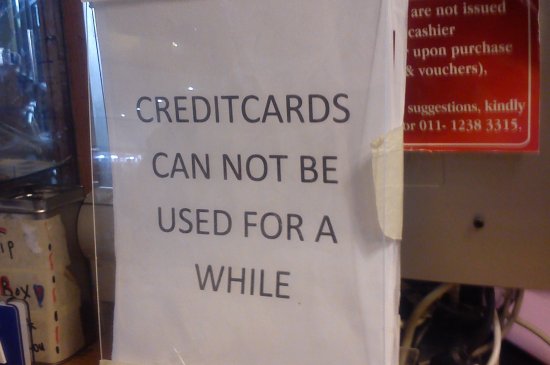
Employment opportunities are on the rise, and the economy is rebounding nicely these days. Even the real estate market is bouncing back. One of the most significant signs of improved consumer confidence is the increase in credit card debt, particularly reflected in December holiday spending. US consumer credit card balances rose by nearly 6% on average year over year. But that's just on average. In fact, many people have run up their balances much more, and this can cause serious financial problems. Here are five warning signs that your credit card spending is out of control:
#1 You use credit cards to pay for necessities
If you have to use credit cards to pay bills, groceries or utility bills because your paycheck isn't enough to meet your obligations, this is a huge red flag that you've got financial problems. Credit cards should be used wisely and conservatively (like for car rentals or to take advantage of rewards programs) but not as a substitute for cash. If you can't afford to pay cash, neither should you swipe your plastic. But for many people, this is the only way they can get by.
#2 Your credit cards are maxed out
If your credit cards are at their limit, that's an obvious sign that you've got financial trouble brewing. In addition to being a challenge to pay off, maxed out credit lines negatively affect your credit score. When you use more than 30% of your total available credit, your credit score begins to decline. The more of your credit line you use, the more significant the hit to your credit score. Plus, once you max out your credit cards, it can be a serious obstacle to get your balances back under control.
#3 You pay off credit with credit
If you have ever paid off one credit card with another or took out a cash advance from one card to pay another, that's a red flag – made worse if you do it often. If you used a home equity line of credit or took on another debt to pay off your credit cards only to run them up again, that's a problem. Many people make the mistake of borrowing to pay off credit cards but then falling back into debt because they cannot afford that loan any more than they could the credit card debt. It's can be a vicious cycle.
#4 You only pay minimum balances
If you can only afford to pay minimum payments on your credit cards, the simple fact is it will take you years – even a decade – to pay off your cards. Paying the minimum will not reduce your balance by much (if any). It typically only takes care of the interest with maybe a couple of bucks that covers the accrued interest. When you reach the point where only minimum balances are affordable, you're in too deep - this can be a frustrating and scary point to reach.
#5 You've skipped credit cards payments
If you ever miss a credit card payment, not only is it a warning sign but it's the start of more serious financial problems. When you miss even one payment, you'll usually be hit with a stiff late fee from $25-$50 (or more), and this will add to your balance causing you more interest costs. And, if the late fee pushes you over your credit limit, that means you'll likely be hit with an over-limit charge as well of $25-$50 (or more). One missed payment can cost you hundreds of dollars.
Once your credit cards get so out of control that you're maxed out and missing payments, collection calls will start. Credit card companies are notorious for aggressive debt collection tactics that compound what's already a stressful financial predicament. If your cards are maxed out, you're late on other bills, living paycheck to paycheck and can't see any way out of this, you need a debt intervention.
Please read the original post on our affiliate site, BillsBills.com
